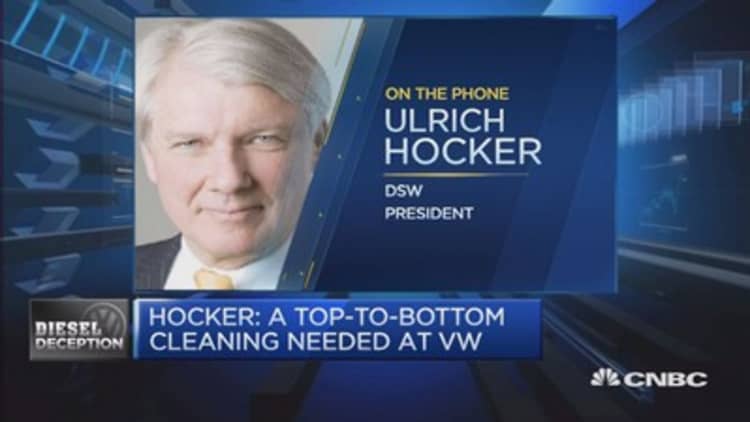
Both Volkswagen and FIFA have been rocked by recent crises, but the two have responded in very different ways. Experts believe there are some valuable lessons for managers on how the two organizations handled their scandals.
CNBC takes a look at how businesses can learn from their mistakes.
Should I stay or should I go?
Swiss authorities announced late last week that they had started investigations into FIFA president Sepp Blatter about a number of issues, including a suspicious payment to UEFA president Michel Platini. The football governing association has been hit by a string of corruption allegations, but Blatter refuses to step down.
Blatter's refusal has been met with disapproval. Andre Spicer, professor of organisational behavior at Cass Business School, said the decision indicated hubris.
"It seems his power has deafened him to even the loudest calls for him to leave. This is common when a leader has been all-powerful for some time," said Spicer in a press statement. "By not heeding all signs of failure, they can end up dragging their firm down with them."
It is time, Spicer warns, for FIFA's to start looking outside the organization on how to act and communicate.
"I think FIFA's biggest problem is hubris. They don't seem to have learnt anything at the moment," Spicer told CNBC in a phone interview. "They need to listen to criticism from outside, and show that they can change the root causes of their problems."
In contrast to Sepp Blatter, Volkswagen CEO Martin Winterkorn , just days after the German carmaker admitted to cheating on U.S. emissions tests. Around 11 million cars could be affected.
On Thursday, German prosecutors said there would be no formal inquiry against Volkswagen, according to media reports.
Read More
Winterkorn's swift resignation, Spicer argues, shows Volkswagen is accepting responsibility for its actions and is trying to show that it is changing the root causes of its problems.
"One lesson (from the Volkswagen scandal) is you can do the wrong things for quite some time, but eventually you get caught," explained Spicer. "They did the right thing owning up to their problems. The danger is if they own up and then forget about it and in 3-6 months' time there's no discussion about it."
How quickly we forget
Spicer has also looked into how companies react to scandals and found that, once the scandal is resolved, organisations tend to forget the lessons they've learned.
"Companies that keep around the reminders of what they did wrong will remember for years later," said Spicer. These reminders could be the people involved, physical evidence or the stories told amongst staff.
Volkswagen's decision to replace Winterkorn with Matthias Mueller from VW subsidiary Porsche since 2010 has received criticism.
"By appointing an insider from within the VW Group as their new CEO, the company has missed an opportunity to restore trust and totally underestimated the challenges they face," said Ian Baxter, CEO of Baxter Freight, in a press statement.
"They should have appointed a highly trusted figure from outside the car industry with a mandate to clean up the mess they've inherited, ship out the management that are implicated and take immediate action to protect the company's financial position."
Baxter added that appointing an outsider was the only way Volkswagen could begin to rebuild the trust of shareholders and regulators. However, hiring an outsider can create its own problems, Spicer argued.
"In the short-term, it will restore trust," he said. "The problem of bringing in an outsider is that they won't know how the business works, so they may make mistakes by bringing in new systems, and they will have to spend a lot of their time building up relationships, contacts and trust."
Outsider expertise
Appointing an outsider can help. For instance, U.K. food retailer Tesco appointed Philip Clarke, who had worked inside the company for years, in 2011 as its new CEO. But Clarke was replaced in 2014 with an outsider, Dave Lewis, because of three years of declining sales and profit warnings during his tenure.
"They appointed an outsider who restored trust," Spicer explained.
Replacing an executive can be a daunting challenge. CNBC asked Rajan Mirpuri, director of recruitment consultancy Hudson Executive, what companies need to consider.
"The appointment of an executive hire is one of the most important decisions a company can make. The cost, implications and repercussions of getting it wrong are too great to measure," Mirpuri told CNBC in an email.
"When making executive-level hiring decisions, Hudson recommends using comprehensive assessment approaches to thoroughly explore aspects such as individual preferences, motivators, abilities and behaviours as they relate to key role expectations and performance requirements."
Follow Luke on Twitter: @LukeWGraham

